Langston Hughes
Langston Hughes
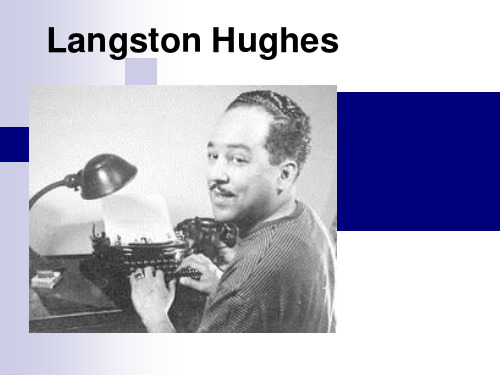
Langston Hughes (1902 – 1967)
Langston Hughes was born in Joplin, Missouri, in 1902. Hughes was considered as one of the most popular black writers and greatest poets. He is an American poet, social activist, novelist, playwright, and columnist.
Langston Hughes (1902 – 1967)
Hughes was the representive of the Harlem Renaissance.
He was the first poet to combine rhythms of black music (jazz music) with poetry and brought the movement of jazz.
"The Father of Harlem Radicalism”
Creative minds like musicians, writers, and artists assembled on Harlem, living and working together. They developed a prosperous artistic scene of literary magazines, cafes, jazz clubs.
Jazz Poetry
Hughes’s first collection of poetry,"Weary Blues“. The whole poem is characterized by the elements of blues and jazz. Elements of black folk culture and the music of the African American church. It is one of the first poems to combine music and poetry.
11兰斯顿 休斯
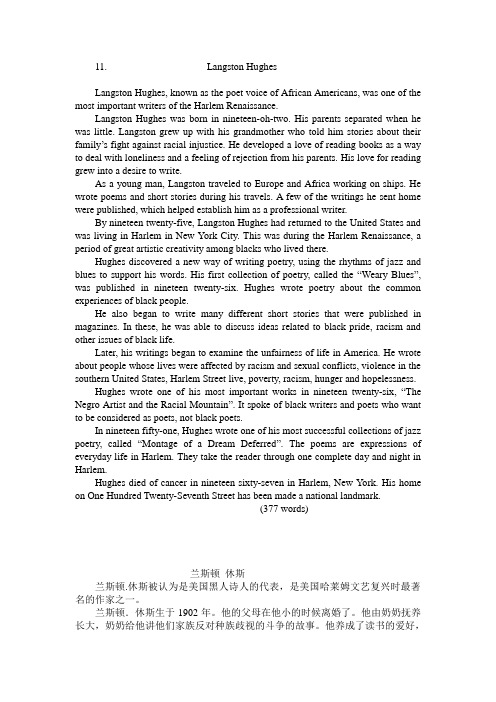
11. Langston HughesLangston Hughes, known as the poet voice of African Americans, was one of the most important writers of the Harlem Renaissance.Langston Hughes was born in nineteen-oh-two. His parents separated when he was little. Langston grew up with his grandmother who told him stories about their family’s fight against racial injustice. He developed a love of reading books as a way to deal with loneliness and a feeling of rejection from his parents. His love for reading grew into a desire to write.As a young man, Langston traveled to Europe and Africa working on ships. He wrote poems and short stories during his travels. A few of the writings he sent home were published, which helped establish him as a professional writer.By nineteen twenty-five, Langston Hughes had returned to the United States and was living in Harlem in New York City. This was during the Harlem Renaissance, a period of great artistic creativity among blacks who lived there.Hughes discovered a new way of writing poetry, using the rhythms of jazz and blues to support his words. His first collection of poetry, called the “Weary Blues”, was published in nineteen twenty-six. Hughes wrote poetry about the common experiences of black people.He also began to write many different short stories that were published in magazines. In these, he was able to discuss ideas related to black pride, racism and other issues of black life.Later, his writings began to examine the unfairness of life in America. He wrote about people whose lives were affected by racism and sexual conflicts, violence in the southern United States, Harlem Street live, poverty, racism, hunger and hopelessness.Hughes wrote one of his most important works in nineteen twenty-six, “The Negro Artist and the Racial Mountain”. It spoke of black writers and poets who want to be considered as poets, not black poets.In nineteen fifty-one, Hughes wrote one of his most successful collections of jazz poetry, called “Montage of a Dream Deferred”. The poems are expressions of everyday life in Harlem. They take the reader through one complete day and night in Harlem.Hughes died of cancer in nineteen sixty-seven in Harlem, New York. His home on One Hundred Twenty-Seventh Street has been made a national landmark.(377 words)兰斯顿休斯兰斯顿.休斯被认为是美国黑人诗人的代表,是美国哈莱姆文艺复兴时最著名的作家之一。
高考英语作文,介绍我最喜欢的诗人

高考英语作文,介绍我最喜欢的诗人Langston Hughes is my favorite poet. Born in 1902 in Joplin, Missouri, Hughes was a prominent figure of the Harlem Renaissance, a cultural movement that celebrated African American art, music, and literature in the 1920s and 1930s. His poetry is known for its powerful imagery, vivid language, and exploration of themes such as identity, race, and social justice.One of the reasons why I admire Langston Hughes is his ability to capture the essence of the African American experience in his work. His poems often reflect the challenges and triumphs of the African American community, shedding light on issues of discrimination, inequality, and resilience. Through his poetry, Hughes gave voice to the struggles and aspirations of his people, inspiring generations of readers with his poignant and heartfelt verses.Moreover, I am drawn to Hughes' poetic style, which blends traditional poetic forms with the rhythms and cadences of African American music and speech. His use of vernacular language, jazz-inspired rhythms, and blues motifs creates a unique and dynamic poetic voice thatresonates with readers of all backgrounds.In conclusion, Langston Hughes is not only a talented poet but also a visionary artist whose work continues to inspire and resonate with readers today. His poetry remains a powerful testament to the beauty and complexity of the African American experience, and I am grateful for the opportunity to explore and appreciate his timeless literary contributions.中文翻译:兰斯顿·休斯是我最喜爱的诗人。
高中英语选修课英语文学欣赏LangstonHughes《黑人谈河流》学生版讲义
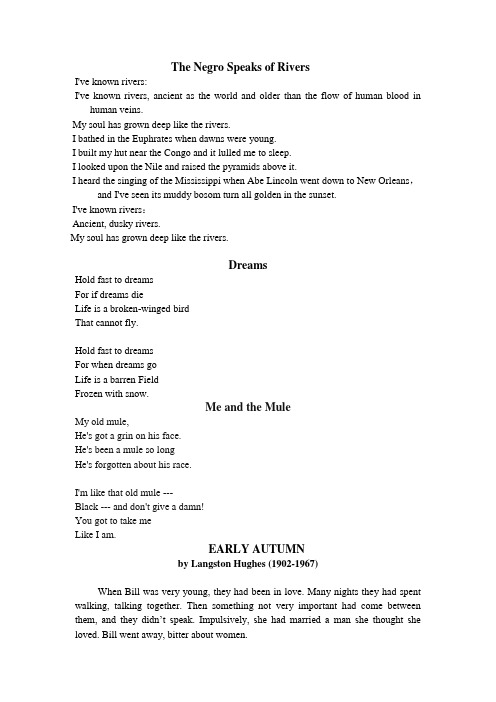
The Negro Speaks of RiversI've known rivers:I've known rivers, ancient as the world and older than the flow of human blood in human veins.My soul has grown deep like the rivers.I bathed in the Euphrates when dawns were young.I built my hut near the Congo and it lulled me to sleep.I looked upon the Nile and raised the pyramids above it.I heard the singing of the Mississippi when Abe Lincoln went down to New Orleans,and I've seen its muddy bosom turn all golden in the sunset.I've known rivers:Ancient, dusky rivers.My soul has grown deep like the rivers.DreamsHold fast to dreamsFor if dreams dieLife is a broken-winged birdThat cannot fly.Hold fast to dreamsFor when dreams goLife is a barren FieldFrozen with snow.Me and the MuleMy old mule,He's got a grin on his face.He's been a mule so longHe's forgotten about his race.I'm like that old mule ---Black --- and don't give a damn!You got to take meLike I am.EARLY AUTUMNby Langston Hughes (1902-1967)When Bill was very young, they had been in love. Many nights they had spent walking, talking together. Then something not very important had come between them, and they didn’t speak. Impulsively, she had married a man she thought she loved. Bill went away, bitter about women.Yesterday, walking across Washington Square, she saw him for the first time in years.“Bill Walker,” she said.He stopped. At first he did not recognize her, to him she looked so old.“Mary! Where did you come from?”Unconsciously, she lifted her face as though wanting a kiss, but he held out his hand. She took it.“I live in New York now,” she said.“Oh,—Smiling politely, then a little frown came quickly between his eyes.“Always wondered what happened to you, Bill.”“I’m a lawyer. Nice firm, way downtown.”“Married yet?”“Sure. Two kids.”“Oh,” she said.A great many people went past them through the park. People they didn’t know. It was late afternoon. Nearly sunset. Cold.“And your husband?” he asked her.“We have three children. I work in the bursar’s office at Columbia.”“You are looking very…” (H e wanted to say old) “…well,” he said.She understood. Under the trees in Washington Square, she found herself desperately reaching back into the past. She had been older than he then in Ohio. Now she was not young at all. Bill was still young.“We live on Central Park West,” she said. “Come and see us sometime.”“Sure,” he replied. “You and your husband must have dinner with my family some night. Any night. Lucille and I’d love to have you.”The leaves fell slowly from the tree in the Square. Fell without wind. Autumn dusk. She felt a little sick.“We’d love it,” she answered.“You ought to see my kids.” He grinned.Suddenly the lights came on up the whole length of Fifth Avenue, chains of misty brilliance in the blue air.“There’s my bus,” she said.He held out his hand. “Goodbye.”“When…”, she wanted to say, but the bus was ready to pull off. The lights on the avenue blurred, twinkled, blurred. And she was afraid to open her mouth as she entered the bus. Afraid it would be impossible to utter a word.Suddenly she shrieked very loudly, “Good-bye!” But the bus door had closed.The bus started. People came between them outside, people crossing the street, people they didn’t kno w. Space and people. She lost sight of Bill. Then she remembered she had forgotten to give him her address—or to ask him for his—or tell him that her youngest boy was named Bill, too.。
04 中英双语诗歌原著解读:梦想-兰斯顿休斯

梦想——兰斯顿.休斯原文:Dreams ——By Langston Hughes梦想——兰斯顿.休斯Hold fast to dreams, 紧紧抓住梦想,For if dreams die, 因为如果梦想逝去,Life is a broken winged bird 生活就只是一只折翅的鸟,That cannot fly. 再也不能飞翔。
Hold fast to dreams, 紧紧地抓住梦想,For when dreams go, 如果梦想消失,Life is a barren field, 生活就是一片荒芜的土地,Frozen only with snow. 被冰雪封冻。
解读:这个梦想跟马丁路德金著名的我有一个梦想息息相关,因为马丁路德金的这篇文章,很大程度上也有受到休斯敦的梦想的诗歌的影响。
休斯敦出生于一九零二年,在美国的文坛,特别是在黑人文学方面,它是一个举足轻重的人物,他有很多的诗歌、文学小说各方面的代表作。
他曾经被誉为是黑人民族的桂冠诗人哈莱姆的桂冠诗人,他曾经有过很多与黑人运动息息相关的文学作品。
可以说他一生的文学活动都同他所处时代的美国黑人运动紧密相连,同广大黑人的命运息息相关。
他曾经有发表过一篇文章,叫做黑人艺术家与种族大山。
曾经这样说啊,我们这些正在从事创作的年轻黑人文艺家抱定宗旨,要既不畏惧,也不羞愧的表现各自的黑皮肤的自我。
如果白人喜欢,我们很高兴如果他们不喜欢,也没有关系。
如果还有人喜欢,我们很高兴如果他们不喜欢他们的不悦,也没有任何关系。
他的文学宣言激励了无数的黑人文学家,经历了无数的黑人运动。
梦想后的fast的是抓住的意思,紧紧抓住梦想。
为什么呢?因为如果梦想死掉die,如同折断翅膀的鸟儿。
生活,就会是一只折断翅膀的鸟儿,再也不能飞翔了。
后半段说梦想要抓住,因为如果梦想消失,go消失,bare是贫瘠的,荒芜的,那么生活就变成了一片荒芜的土地,被冰雪冰冻。
一首非常立志非常感人的小诗,休斯这首诗歌短小精悍又让人非常感动。
我喜爱的诗人英语作文

我喜爱的诗人英语作文I have always been a fan of poetry, and there is one poet in particular that I admire greatly. His name is Langston Hughes. His poetry is powerful and moving, and it speaks to the struggles and triumphs of the African American experience. Hughes' use of language is so evocative, and his words have a way of staying with you long after you've read them.Langston Hughes was a master of using simple, everyday language to convey deep and complex emotions. His poems often explore themes of identity, inequality, and the human experience. One of my favorite poems by Hughes is "The Negro Speaks of Rivers," which beautifully captures the connection between the African American experience and the ancient rivers of the world.What I love most about Hughes' poetry is its ability to transcend time and speak to the universal human experience. His words have a timeless quality that makes them just asrelevant today as they were when he first wrote them. Hughes' poetry reminds us of the power of language to connect us to our shared humanity and to inspire change.In addition to his poetry, Langston Hughes was also a prolific writer of essays, plays, and short stories. His work has had a profound impact on American literature and continues to be celebrated and studied to this day. I am grateful for the legacy that Langston Hughes has left behind and the way his words continue to resonate with readers of all backgrounds.In conclusion, Langston Hughes is a poet whose work has had a lasting impact on me. His ability to capture the human experience in simple yet profound language is truly remarkable. I will always admire his poetry and the way it continues to inspire and provoke thought.。
early autumn by Langston Hughes 早秋兰斯顿休斯原文及作者简介
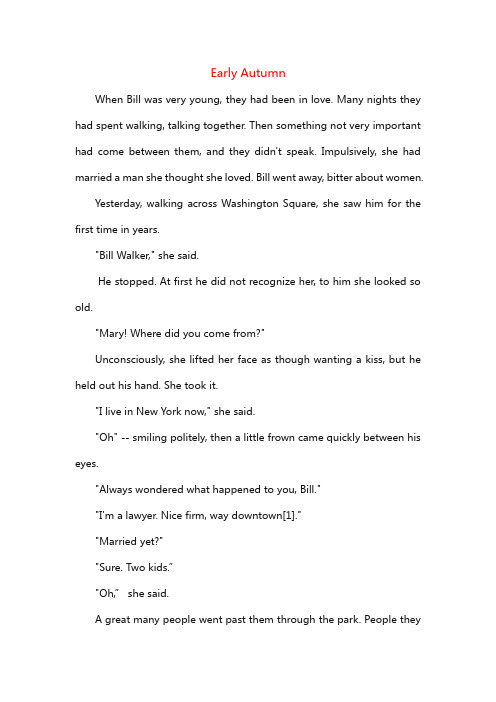
Early AutumnWhen Bill was very young, they had been in love. Many nights they had spent walking, talking together. Then something not very important had come between them, and they didn't speak. Impulsively, she had married a man she thought she loved. Bill went away, bitter about women.Yesterday, walking across Washington Square, she saw him for the first time in years."Bill Walker," she said.He stopped. At first he did not recognize her, to him she looked so old."Mary! Where did you come from?"Unconsciously, she lifted her face as though wanting a kiss, but he held out his hand. She took it."I live in New York now," she said."Oh" -- smiling politely, then a little frown came quickly between his eyes."Always wondered what happened to you, Bill.""I'm a lawyer. Nice firm, way downtown[1].""Married yet?""Sure. Two kids.”"Oh,” she said.A great many people went past them through the park. People theydidn’t know. It was late afternoon. Nearly sunset. Cold."And your husband?” he asked her.“We have three children. I work in the bursar’s office at Columbia[2].”“You’re looking very…” (he wanted to say old) “…well,” he said. She understood. Under the trees in Washington Square, she found herself desperately reaching back into the past. She had been older than he then in Ohio. Now she was not young at all. Bill was still young."We live on Central Park West[3]," she said. "Come and see us sometime."“Sure,” he replied. “You and your husband must have dinner with my family some night. Any night. Lucille and I’d love to have you.”The leaves fell slowly from the trees in the Square. Fell without wind. Autumn dusk. She felt a little sick."We'd love it," she answered."You ought to see my kids." He grinned.Suddenly the lights came on up the whole length of Fifth Avenue[4], chains of misty brilliance in the blue air."There's my bus," she said.He held out his hand. "Good-bye.""When..." she wanted to say, but the bus was ready to pull off. The lights on the avenue blurred. And she was afraid to open her mouth as she entered the bus. Afraid it would be impossible to utter a word.Suddenly she shrieked very loudly, “Good-bye!” But the bus door had closed.The bus started. People came between them outside, people crossing the street, people they didn't know. Space and people. She lost sight of Bill. Then she remembered she had forgotten to give him her address—or to ask him for his -- or tell him that her youngest boy was named Bill, too.Notes________________________________________1. way downtown: 在市中心2. Columbia: Columbia University3. Central Park West: 中央公园西部,纽约住宅区。
langston hughes 蓝斯顿·休斯
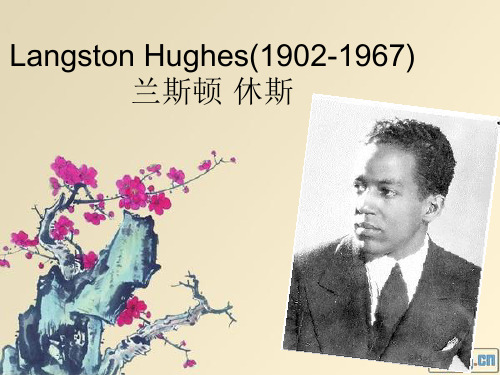
Border Line
Hughes是一个温和派诗人, 从不用狂暴的呐喊和激愤的 指责来取代他对美国社会所 进行的含蓄的抗议和诅咒。 有别于以往一贯的风格,诗 人在《分界线》中表达了自 己对于美国黑人生活在水深 火热之中这一现状的激愤之 情。
Drama
Black Nativity (1961) Don‘t You Want to Be Free? Nhomakorabea1938)
Poetry in Translation
Cuba Libre (1948)
Translation
Masters of the Dew (1947)
Dreams
“梦想”代表着美好的理想和希望,加入没 有梦想,生活就会逝去目标和方向,就会 变得死气沉沉。 Dreams 中的梦想还有其他的含义:是保守 种族歧视之苦的美国黑人对自由、平等和 民权的向往,是黑人们忍受压迫、剥削和 社会不公正待遇所不可缺少的精神支柱。
Langston Hughes died of complications from prostate cancer in May 22, 1967, in New York. In his memory, his residence at 20 East 127th Street in Harlem, New York City, has been given landmark status by the New York City Preservation Commission, and East 127th Street has been renamed "Langston Hughes Place."
Me and the Mule
在Me and the Mule中,Hughes描述 的是一个服从、温顺、心地善良的老 黑奴汤姆叔叔的形象。它的脸上总是 挂着笑容,而且它听命于主人的使唤 为时已久,几乎已经忘记了自己的种 族本能。诗人对这头骡子有着深厚的 感情,因为他跟自己一样,都长着黑 涩的皮肤。Hughes 并不因为自己是 黑人而感到羞耻,相反,他公开表示 为此感到自豪。
- 1、下载文档前请自行甄别文档内容的完整性,平台不提供额外的编辑、内容补充、找答案等附加服务。
- 2、"仅部分预览"的文档,不可在线预览部分如存在完整性等问题,可反馈申请退款(可完整预览的文档不适用该条件!)。
- 3、如文档侵犯您的权益,请联系客服反馈,我们会尽快为您处理(人工客服工作时间:9:00-18:30)。
• 1963: Harvard University awarded Hughes an honorary doctorate.(荣誉博士) • 1964: Western Reserve University awarded Hughes an honorary Litt.D.(荣誉硕士)
• 1973: the first Langston Hughes Medal was awarded by the City College of New York.
Me and the Mule
• My old mule, He's got a grin on his face. He's been a mule so long He's forgotten about his race. • I'm like that old mule -Black -- and don't give a damn! You got to take me Like I am.
梦想
紧紧抓住梦想 梦想若是消亡 生活就像断翅的鸟儿 再也不能飞翔 紧紧抓住梦想 梦想若是消丧 生活就像贫瘠的荒野 雪覆冰封,万物不再生长
Effect:
1960s黑人领袖马丁·路 德·金那篇流传至今、脍炙人 口的《我有个梦想》跟休斯的 关于“梦想”的诗歌有直接的 联系。
Themes: racism, sexual conflicts, violence in the Southern America, Harlem street life, poverty, hunger and hopelessness.
Awards
• 1926: Hughes won the Witter Bynner Under-
-graduate Poetry Prize.(宾纳大学生诗歌奖) • 1935: Hughes was awarded a Guggenheim Fellowship(古根海姆学者奖), which allowed him
Dreams
Hold fast to dreams For if dreams die Life is a broken-winged bird That cannot fly. Hold fast to dreams For when dreams go Life is a barren field Frozen with snow.
(纽约城市大学)
•2002: The United States Postal Service (美国邮政署)added the image of Langston Hughes to its Black Heritage series of postage stamps. • 2002:Scholar Molefi Kete Asante listed Langston Hughes on his list of 100 Greatest African Americans.
• 1960: the NAACP(全国有色人 种协会)awarded Hughes the Spingarn Medal (斯平加恩章 )for distinguished achievements by an African American. • 1961: National Institute of Arts and Letters.
பைடு நூலகம்
• The Weary Blues《疲惫的蓝 调》,Knopf ,1926 • Fine Clothes to the Jew,《抵押给犹 太人的好衣服》 Knopf, 1927 • Let America Be America Again, 《让美国再次成为美国》,1938 • Montage of a Dream Deferred, 《耽搁的梦想蒙太奇》Holt, 1951
(1902-1967)
兰斯顿·休斯 Born February 1st, 1902.Joplin, Missouri, USA.
Died
May 22, 1967 (aged 65)New York City, New York, United States. Occupation Poet,columnist,dramatist,essayist, lyricist, novelist. Ethnicity African American, WhiteAmerican, Native American .
His Values
• Anti-fascism(反法西斯) • Racial Equality(种族平等) • Democracy(民主) • Freedom(自由)
• Langston Hughes died on May 22, 1967 at the age of 65.
• Leaving behind a legacy, young authors of all colors look towards Langston Hughes for motivation.
Honors
• He was one of the earliest innovators of the then-new literary art form called jazz poetry.最早使用爵士音乐朗诵 的诗歌的先驱 • Hughes is best known as a leader of the Harlem Renaissance哈莱姆文艺复兴的中 心人物 • A poet represented the voice of African American.非裔美国人之音的代表
• 他在1926年发表在《民族》杂志上 的《黑人艺术家与种族大山》中大 无畏地宣称:“我们这些正在从事 创作的年轻黑人文艺家抱定宗旨要既不 畏惧也不羞愧地表现各自的黑皮肤的自 我。如果白人喜欢,我们很高兴;如果 他们不喜欢也没有关系。„„ 如果黑人 喜欢,我们很高兴;如果他们不喜欢, 他们的不悦也没有任何关系„„” 这篇 文学宣言激励了无数黑人文学家,也确 立了他在哈莱姆文艺复兴运动中的领袖 地位。
to travel to Spain and Russia. • 1941: Hughes was awarded a fellowship from the Rosenwald Fund.(罗森沃尔德交易基金) • 1943: Lincoln University awarded Hughes an honorary Litt.D.(荣誉文学博士) • 1954: Hughes won the Anisfield-Wolf BookAward.
